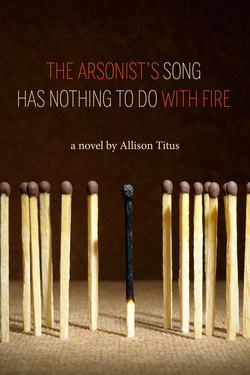Читать книгу The Arsonist's Song Has Nothing to Do With Fire - Allison Titus - Страница 28
На сайте Литреса книга снята с продажи.
ОглавлениеThe movie theatre was a fifteen-minute walk from the house and easy to find—seven blocks east, then maybe four blocks north—across from a 24-hour pharmacy that rarely stayed open past ten. The theatre was a boxy two-story that held firmly to its crumbling street corner. The ticket booth glowed.
Vivian considered her options. The showing she was about twenty minutes late for was a Hindi film. The poster for it, hanging next to Tickets and spotlighted by a flickering bulb, showed a woman wrapped in a red sari, from the elbows up, one of her eyes reflecting a fence of bars all linked up to form a tiny cage, like a thimble basket. Vivian bought a ticket and passed through the lobby—threadbare rose carpet, faded fleur de lis wallpaper and dim chandeliers—up a short spiral staircase to auditorium two, which was empty though the movie played anyway, sifting a boisterous soundtrack through the aisles and over all the vacant seats.
In the film there was a ceremony. One of the daughters of the first family, Chitra, was going to marry the son of the man who walked with a cane. Chitra, the woman from the poster. On the terrace when the rain started: a deluge that conjured a sudden river. A locket shoved hastily inside a drawer. Sheet of black hair braided patiently into an elaborate crown. Lotus blossoms spun downstream. The clouds gathered. A woman lit candles then placed them one by one in barrel-shaped lanterns. A can of condensed milk, folded into the bowl of flour. The clock struck four. She was kneeling. She was on her hands and knees sifting through the dirt, trying to unbury something. Or bury something.
Halfway through the film the theatre door opened. Vivian assumed it was an usher staking out his ten-minute break. Instead it was another moviegoer, a guy who walked down to the front and slid into a seat, which felt to Vivian mildly disturbing, an interruption that displaced her privacy even in the dark room. On the screen, another suitor had arrived. When he opened a suitcase a cloud of finches shimmied out, then took off, soaring over the crowd of guests. And now the new family, the man with the cane, his wife in perfectly draped silk, her bangles slipping as she reached to tap his shoulder—Vivian found that she could watch the action and simultaneously keep the guy up front in her peripheral view. He restlessly leaned forward, leaned back.
A finch in someone’s pocket; a boy with a comb in his mouth. A third sister, possibly a cousin, threaded a needle and strung a palmful of teeth on a ribbon one by one. The final scene was in grayscale, someone tossing a fistful of birdseed at someone else’s feet.
She watched the credits trail over the screen, cursive that scrolled to fog letters, and pretended to be deep in concentration about something when she saw the guy standing, walking up the aisle, headed her way. Turning to reach for her coat just as he got to her row and moved past, she listened to the door swinging closed behind him, a dull thud. Her face burned with the recognition that she knew the guy, after all, because he was her neighbor.
